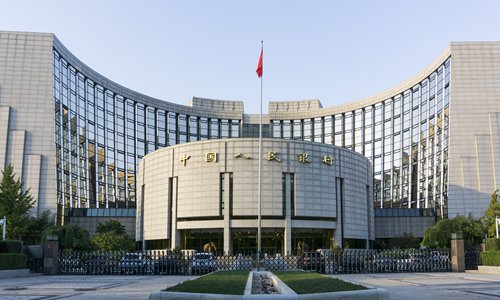HOME >> BUSINESS
China steps up liquidity with RRR cuts amid trade war
Source:Global Times Published: 2019/9/6 22:24:41

The headquarters of the People's Bank of China in Beijing in October 2018 Photo: IC
The People's Bank of China (PBC), the country's central bank, announced Friday a cut in the reserve requirement ratio (RRR) for financial institutions of 50 basis points on September 16 in the latest effort to bolster the real economy.
The RRR held by some urban commercial banks will be cut by 100 basis points to offer more support for small and micro firms, the PBC said. The cut will be implemented in two stages - on October 15 and November 15.
The latest move will release long-term funds of about 900 billion yuan ($126.4 billion), including about 800 billion yuan, due to overall RRR cuts, and about 100 billion yuan due to targeted RRR cuts.
During a State Council meeting on Wednesday, China announced it will make timely cuts to overall and targeted RRRs to boost liquidity to support the real economy amid downward pressure.
Analysts said there is still room for further RRR cuts to boost the liquidity of financial institutions.
E Yongjian, a researcher at the Bank of Communications, said in a research note sent to the Global Times that this round of RRR cuts will have higher efficiency in transferring to the real economy compared to the previous moves.
These are the third RRR cuts by the PBC this year, also the second overall RRR cuts.
"There is space for RRR cuts in the future but the adjustment range won't be large," said E, adding the prudent monetary policy has not changed.
RRR cuts and the new loan prime rate (LPR) will become major tools of the central bank in launching regulations amid the external uncertainties caused by the trade war and downward economic pressure.
Li Daxiao, the chief economist at Shenzhen-based Yingda Securities, told the Global Times that the latest RRR cuts will bolster China's A-share market and play a key role in promoting steady economic growth.
The benchmark Shanghai index is expected to rebound to 3,000 next week.
At Friday's closing, the Shanghai Composite Index inched up 0.46 percent to 2,999.60 points and the smaller ChiNext market index rose 0.19 percent to 1,692.24 on Thursday.
Posted in: ECONOMY